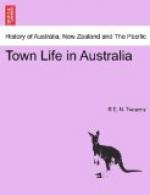The Bill on which the Coalition Ministry was defeated was merely a digest of preceding Acts on the subject; and what contributed no little to the fate of the Ministry, both in the House and in the country, was the circumstance that not one of them, except Sir John Robertson, took any interest in the Land Reform question, and that, until his recent coalition with Sir John, Sir Henry Parkes had been one of the most bitter opponents of the measures, on the consolidation of which he staked the life of his Government. Sir John had undoubtedly taken a back seat in the Coalition Government, and it was partly to revive his failing prestige that Sir Henry Parkes brought in a measure which was notoriously indifferent to himself. His brilliant reception in Europe and on his return to Australia had turned his head, and he believed he could make the House and country swallow whatever he chose. But his vaulting ambition o’erleaped itself, and in his chagrin and mortification he has unveiled the mask of respectability which he has worn for the last few years, and given vent to language and sentiments which have seriously injured the position he was achieving and the prospects of a return to office. These should have been excellent, since the new Ministry is weak in personnel, and has before it the duty of framing a new land policy, which is much more difficult than that of picking holes in the existing system. For the present they have shelved the question by appointing a Royal Commission to inquire into the working of the land laws. The programme for the session, revealed in the Speech from the Throne, contains nothing more startling than amendments of the Licensing Act and Criminal Laws, and measures for the establishment of secondary schools throughout the colony, and to abate the rabbit pest.
The leading measures introduced by the Coalition Ministry during their four years’ tenure of office were, if we except a Licensed Victuallers’ Amendment Act, an Educational Act on the basis of that existing in the other colonies, which served as a trump-card at the 1881 general elections, and a measure for constitutional reform, in which they were checked by the Upper House in 1879. Sir Henry’s object, like Mr. Berry’s, was to strengthen the hands of the Assembly, but unfortunately for his scheme he had a very different class of electors at his back. As happened over the Land Act, his weathercock failed to point in the right direction. When the Council rejected his Bill, he indulged in threats and fulminations which would have done credit to a Berryite of the Berryites. But the country utterly refused to back him up. It would not be roused into indignation on one side or the other, and was utterly indifferent as to whether the Council was reformed or continued as of old.. So after a few days fuming and fretting, Sir Henry thought it wiser to let the matter drop. The Legislative Council still remains nominated by the Crown, the tenure of office being for life. On the Education Act, Sir Henry’s platform was the consolidation of a system of secular education and the withdrawal of all grants in aid of denominational schools. Here, as on the Land Act, he had held other views in other times; but in this instance he caught the direction of the wind correctly and sailed before it triumphantly.




